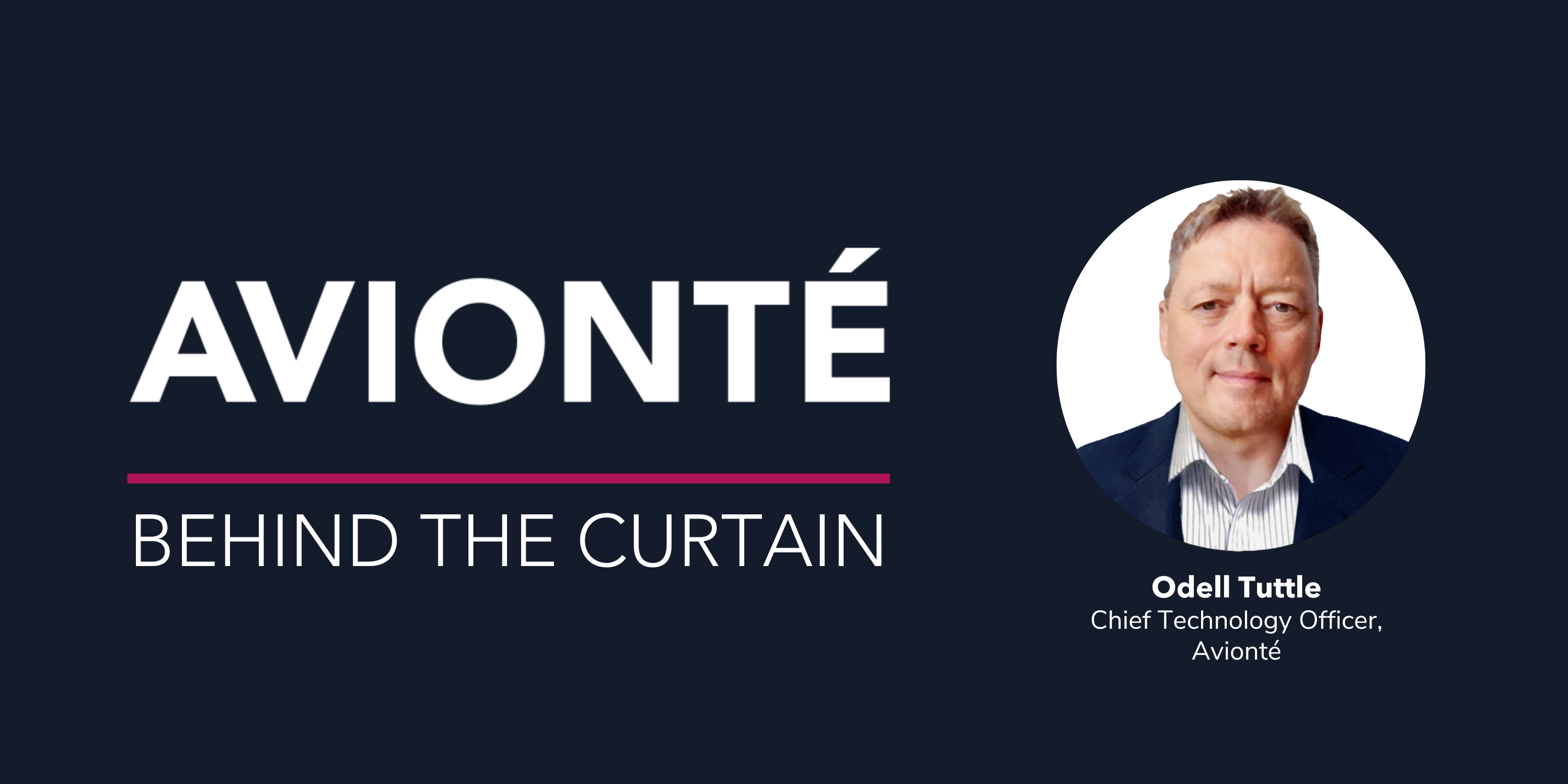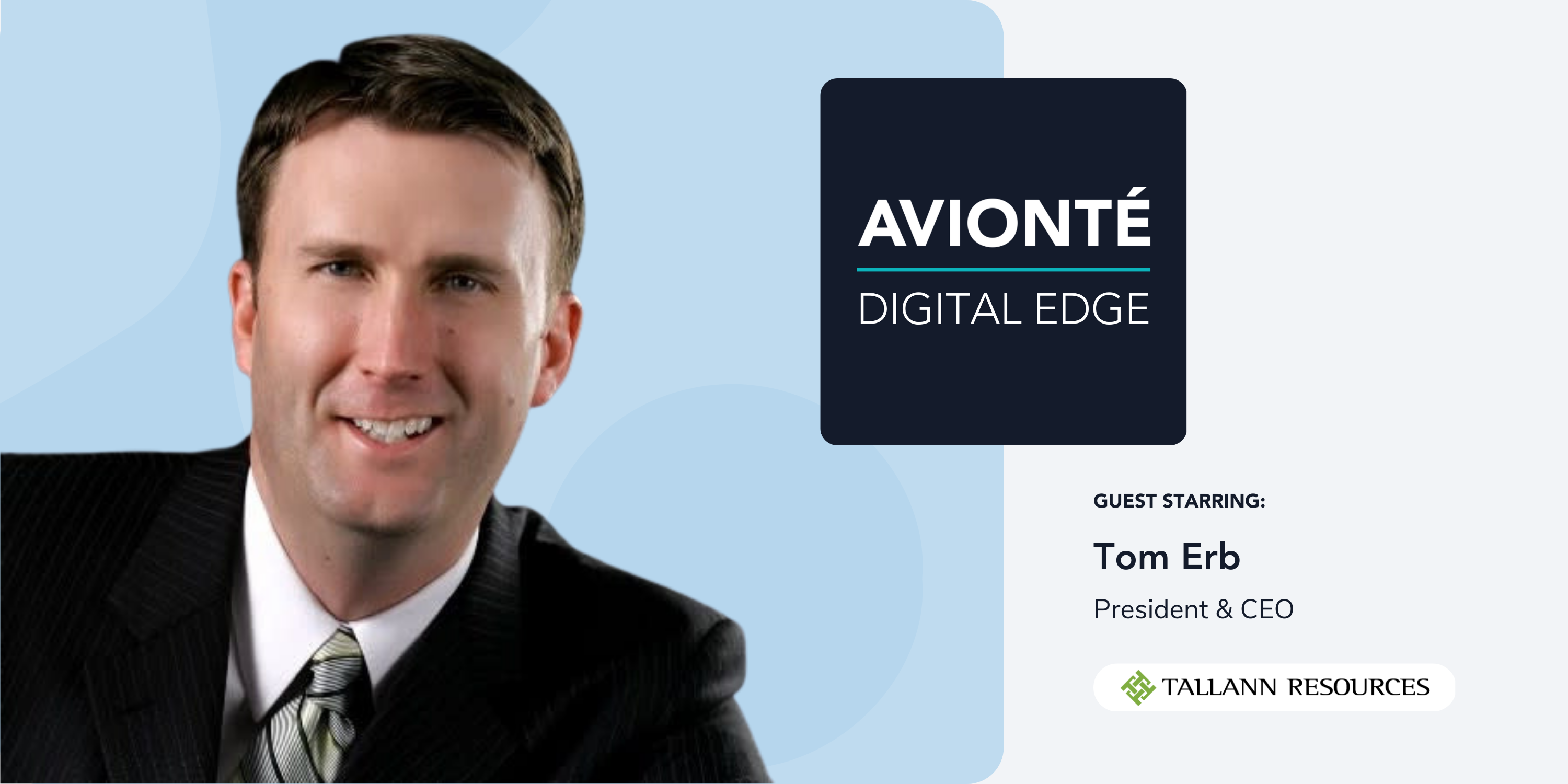The age of artificial intelligence is here – and is set to change many aspects of the recruiter’s day-to-day role, including the way he or she sources, hires, and places talent! With all the recent buzz surrounding AI, automated talent platforms, and staffing technology, one question remains top of mind for many recruiters: Are robots coming for my job? Could artificial intelligence simply replace the “special sauce” or human element in staffing, namely the recruiter’s ability to find, coach, and develop the right talent for their employer? And how is the traditional role of the recruiter going to change due to technological innovation?
In this episode of Avionté: Digital Edge, Chris Ryan, Chief Marketing and Strategy Officer at Avionté, sits down with Tom Erb, President of Tallann Resources, LLC, to discuss how the traditional role of the recruiter is going to change due to technological innovation.
This is a partial transcript of the full conversation. Listen to the podcast episode for the complete discussion.
Chris Ryan: In 2023, the staffing industry is projected to grow at an anemic 2% year over year, from only 212 billion to 216 billion dollars, but one sector of staffing – automated talent platforms, a business model that replaces recruiters with artificial intelligence and automation – doubled in size and is projected to grow 19% annually through 2030.
With all the recent news around artificial intelligence, we have one key question: Are robots coming for the recruiters?
My name is Chris Ryan, and I’m the Chief Strategy and Marketing Officer for Avionté. With me today to explore the evolving role of the recruiter in the age of artificial intelligence is Tom Erb, president and CEO of Tallann Resources, a consulting firm that provides strategic and tactical guidance to staffing.
Before we begin, I’d like to provide some perspective on recruiters and the role of technology in recruiting.
Historically, staffing agencies always prided themselves on their human judgment, their ability to find, coach, and develop the right talent to meet the needs of their employer customers. Staffing agencies often describe this human judgment as their special sauce Today, however, some companies argue that the recruiter’s judgment – the special sauce – can be captured and replaced through artificial intelligence.
The argument is it’s much cheaper to match talent with employers directly without a human intermediary. SIA research suggests that staffing platforms can deliver about 30 to 40% more in revenue per employee than through traditional staffing. And Barry Asin, the President of SIA, has noted on multiple occasions the rapid convergence of traditional staffing, digital talent, online staffing platforms, and gig work.
The question becomes: what happens to the recruiter in this new environment? So, Tom, if I’m a recruiter, are my days numbered? Are the robots and the chatbots coming for my job?
Tom Erb: So, I asked ChatGPT this question last night, and she said that no, they’re fine. So, if ChatGPT thinks they’re fine…
But, seriously, if we take a look at what recruiters do on a day-to-day basis, many of them are at risk of their job being done by just regular workflow automation. The average recruiter that’s out there in the staffing industry is basically doing keyword searches on job boards and is processing applicants, and that can be automated.
So, will good recruiters be replaced by AI? No. Absolutely not. But if you’re a recruiter that’s just processing applicants, then a lot of what you’re doing is going to be automated.
Chris Ryan: The implications are that the recruiting job is going to evolve or change significantly. And it really comes down to where the value is being added by the recruiter.
Tom Erb: Yeah. It has to change. In the last six to twelve months, we’ve seen AI take considerable leaps. Nobody was talking about ChatGPT even six months ago. Now, everybody’s talking about it.
And then you have all of these different iterations of it, particularly in the staffing and recruiting industry, that are meant to handle some of the repetitive tasks that don’t need to be done by a professional. So, we have to change. And, as an industry, we’ve always done a pretty poor job of adapting to technology.
So, this is the next iteration of that. The companies that adapt and the recruiters that adapt, leverage it, and scale it are going to be the real winners.
Chris Ryan: Let’s talk a little bit about digital talent platforms for a minute. It’s the fastest growing area of staffing. From your perspective, where are digital talent platforms getting traction, and why are they enjoying their current success?
Tom Erb: Well, I think it’s a combination of things. If you really think about what you do on a daily basis, we like to do self-serve. If I’m looking for a house, I may eventually pull in a real estate agent. But in the beginning, I’m going to be online and looking at realtor.com and Zillow and all that, and it’s kind of fun and it’s easy for me to do that.
If I want to do something with my cable, or with ordering a phone, or whatever it might be, I don’t want to have to talk to a live person every time. I usually end up talking to a live person when I have an issue that I can’t solve via going online or doing it from my phone.
And so, I think that’s partly what we’re seeing. As online platforms have evolved and gotten more user-friendly, that has just made it more attractive. That’s in line with what consumers are looking for in the rest of their lives.
Chris Ryan: Are you telling me that face-to-face interaction is stressful? If that’s the case, then I can’t think of a more face-to-face business than staffing.
Tom Erb: One of the things that I see over and over again is that we don’t do a great job of candidate experience. Value-added interactions, people welcome. Human interaction without value is not desired.
If I can go and do something really quickly online, that is better than dealing with somebody who’s basically just processing me. I think the real key is how are we interacting with people when we do have these communications.
Chris Ryan: What are some of those value-added interactions that you think are important to staffing? Where do you think the recruiter has the advantage, and where can they add real value going forward?
Tom Erb: I think the biggest thing that recruiters need to do is to move from job-based recruiting to candidate-based recruiting. Most recruiters have a job or multiple jobs that they’re trying to fill, and then they go out and try and find people that can fill those jobs. And so, in a lot of cases, we’re processing them to see if they qualify for this job, and we may be trying to shoehorn them into a job that they don’t necessarily want, but we need filled.
That may have worked when were in a in a job-driven market where we had a lot more candidates than we had jobs, and we could pick from different candidates and see which were the right ones to put into the jobs we needed filled. Now, this is a candidate-driven market. We have a lot less talent than we have jobs.
So, what we really need to do is reach out to candidates and say, What is it that you’re looking for? Where would you be the happiest? What is the ideal job that you’d like to find? Let’s see if we can go and find that for you. Let’s see if we can reach back out to certain clients that we have and really represent you.
It’s almost acting more as an agent than it is somebody who’s trying to fill a job. And that’s one of the biggest things we can do to change that interaction. I know you used the term consumerization, and I really think that’s the big thing. It’s about looking at the candidate as the consumer, not as inventory.
Chris Ryan: But that implies that the recruiter is going to be doing something completely different. For one thing, it turns recruiting into a team-based activity.
As I think about it now, when you’re trying to fill a job, each recruiter has their own favorite people. They don’t necessarily share them with other recruiters in their own firm. They might not even put them into the system if they don’t want other people to nab their talent. But now you’re saying the recruiters all need to work together and get all the talent in one pool.
How could a recruiter do that better than a digital talent platform? Is it the personal engagement or the exploration? Or is there something else?
Tom Erb: Well, first of all, I don’t even like the term recruiter for the staffing industry. It’s too limiting. It’s too focused on the front-end of the equation.
We’re talking about having significant talent shortages for the rest of our careers, regardless of if we’re doing this for five more years or 50 more years. So, the talent shortage is going to continue.
So, we really need to shift focus to: how do we maximize the relationship with the people that we do engage with, and how do we keep them on assignment for as long as we possibly can? How do we redeploy people into different assignments? Do they look at us as an employer of choice, rather than a necessary evil?
I really look at career advocates, staffing specialists, those types of things where we can say your responsibility is not just to find, attract, and submit these candidates. It’s also to be the primary relationship owner during their entire career with the staffing firm.
And that requires continuing engagement. People still want human interaction, and so we can’t replace all that human interaction with a bot no matter what.
Chris Ryan: So, what I hear you saying then is to make the technology really work, you want a fundamentally different kind of recruiter. It’s somebody who can get into the head of the talent and coach them to show up, be competent, be reliable, develop new skills, to come back. You don’t believe the fundamental challenge of talent advocacy is something that can be handled without a recruiter, but that certain aspects of what recruiters do can and will be replaced by technology.
Tom Erb: I think there are certain things that are already being replaced – things like candidate sourcing, which is really just keyword searching. But then we’re seeing AI chatbots that are reaching out to candidates, engaging or re-engaging, having sometimes fairly in-depth conversations, offering up jobs, being able to schedule interviews with the recruiters – ultimately being able to do all of those things.
And then it’s handed off to a live person that has the skills to do the final vetting, to be able to build that relationship. It’s almost as if a big chunk of the recruiting process, the sourcing process, is going to be automated, and the recruiters are going to be the ones that take it across the finish line.
Automation’s going to be able to handle that first part, which I think is going to allow us to have the really good recruiters scale. And that’s where the advantage is. There’s 11 million open jobs, and there’s plenty of opportunity that’s out there and will continue to be out there – and it’ll allow us to scale up more.
Chris Ryan: How does the staffing agency make itself more distinctive? How do they create a more distinctive brand and how do they actually market to the industry? Most staffing agencies are ultimately sales-driven organizations. If recruiters aren’t sourcing, then the staffing agency is going to have to invest more in marketing as well. Isn’t that the case?
Tom Erb: Certainly. I would say a couple things. One is that our industry tends to be slow to adopt technology. So, you’ve got staffing companies that still aren’t using some of the technology that’s been around for years and years. So, this isn’t going to be a wholesale change.
I think the whole value prop is going to shift from we go out and get you this talent to we are able to attract and retain the best talent, because we use technology that allows us to scale and have our staffing specialists focus on finding the right person and keeping them as long as possible, building those relationships, being an employer of choice. So, I think it’s just really about shifting the value prop from the talent hunter to the relationship builder and what all that entails.
Chris Ryan: I’d like you to opine a little bit on what staffing agencies need to do to better compete with alternate forms of income, such as the gig economy.
Tom Erb: I’ve been talking for years about having candidate-centric job postings and candidate-centric language as opposed to employer-centric.
But you still go on Indeed and other job sites, and 99.9% of the jobs read like they’re a job description. It’s a list of what the employer wants, not of what the opportunity is for the candidate. And so, the companies that do a better job marketing to the candidates are the ones that are going to win.
One of the things that makes a huge difference for staffing companies is to look at those candidates or potential candidates as consumers. We should be marketing out to them, as opposed to just putting a job out there saying: “The ideal candidate must possess the following…” Who wants to apply to that job? We’re acting like we’re in 2008 when we had a bunch of unemployment and people had no other options. Now, they have all sorts of options.
So, one of the biggest things that we can do is really change our mindset and our focus to being candidate centric. What is it that’s going to attract the candidate?
It’s the other reason why I don’t like the term recruiter, because I don’t think the industry does recruiting. I think we post jobs and process people. So, we need to get out and recruit people. We need to sell to them that, hey, this is a good opportunity, that we’re a good employer. Your life is going to be better off coming and working for us.
If you’re listening to this podcast, and you’re thinking, we already do that, you are in the overwhelming minority, and it is a real competitive advantage for you.
Chris Ryan: What do you think the role is going to look like in 20 years? Or is it going to be a bunch of different roles that we haven’t even really described before?
Tom Erb: A lot of people ask me, do I feel that the staffing profession is going to go the way of the travel agent, right?
I equate it to a different profession, which is real estate. You go onto realtor.com and Zillow, and you look at different things. But, at the end of the day, you’re probably going to need to engage a realtor. The difference is the realtor’s being engaged later in the process than they used to be.
That’s where I see recruiting going. The stuff that’s easier to do, that can be easily done self-service, that’s going to be done through automation. But the more nuanced, skilled stuff is going to be done by highly skilled recruiters. And that’s what we’re going see more and more.
I still think the staffing industry is going keep growing though. I think that it will grow by revenue, but also by internal headcount. We’re just going to keep scaling.
Guest
Tom Erb
President and CEO at Tallann Resources, LLC
With a career spanning nearly 20 years, Tom Erb has established himself as one of the staffing and recruiting industry’s top subject matter experts. As an executive for two of the largest staffing and recruiting companies in the world, Tom worked with some of the most recognizable and well-respected companies in the United States to help optimize their workforce strategy. As a consultant, trainer, and speaker to the staffing and recruiting industry, Tom has helped hundreds of firms create and execute sales and recruiting strategies to grow their business.
Host
Christopher Ryan
Chief Strategy & Marketing Officer at Avionté
Christopher Ryan leads the Strategy and Marketing functions for Avionté. He brings more than three decades of consulting, thought leadership, and corporate experience in Human Capital Management.
About Avionté Digital Edge
Modern technology has revolutionized the way we live, work, and play. It’s also what’s fueling the gig economy which has dramatically changed employment practices. So, what does that mean for staffing and contingent work? In our Avionté Digital Edge podcast series, we will speak directly with industry experts to explore topics and trends related to the digital transformation of staffing and temporary employment in the US workforce.
Subscribe to Avionté Digital Edge on These Platforms













